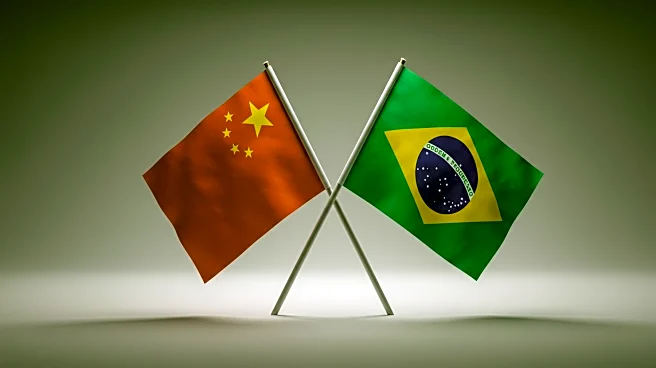What's Happening?
Chinese President Xi Jinping has proposed that China and Brazil serve as a model of unity and self-reliance for the Global South. During a phone call with Brazilian President Luiz Inacio Lula da Silva, Xi expressed China's readiness to collaborate with Brazil to create a more equitable world and sustainable planet. The state-run Xinhua news agency reported that Xi emphasized the historical strength of China-Brazil relations and the smooth progress in aligning their development strategies. Xi also voiced support for Brazil's national sovereignty and legitimate rights, urging global unity against unilateralism and protectionism. The discussion included topics such as the role of the Group of 20 and BRICS in defending multilateralism, peace negotiations between Russia and Ukraine, and expanding cooperation in sectors like health, oil and gas, the digital economy, and satellites.
Why It's Important?
The strengthening of China-Brazil ties could have significant implications for global trade dynamics, particularly in the context of U.S. trade policies under President Trump. As China surpassed the U.S. as Brazil's largest trading partner in 2009, with bilateral trade reaching $188.17 billion last year, this partnership could influence economic strategies in the Global South. The collaboration between China and Brazil may encourage other emerging economies to seek similar alliances, potentially reducing reliance on Western markets. This development could also impact U.S. economic interests, as increased cooperation among BRICS nations might lead to coordinated responses to U.S. tariffs, affecting American exports and trade relations.
What's Next?
The ongoing dialogue between China and Brazil suggests potential future initiatives aimed at enhancing bilateral cooperation. Both countries have expressed interest in identifying new business opportunities, which could lead to increased investments and joint ventures. Additionally, the upcoming COP30 world climate conference in Brazil presents an opportunity for China to play a pivotal role in global environmental discussions. As President Trump continues to implement trade tariffs, emerging economies may further explore collaborative strategies to counteract these measures, potentially reshaping international trade policies and alliances.
Beyond the Headlines
The emphasis on self-reliance and unity by China and Brazil could signal a shift towards more independent economic policies among Global South nations. This approach may foster greater resilience against external economic pressures and promote sustainable development practices. The collaboration could also influence geopolitical dynamics, as countries in the Global South might increasingly prioritize regional partnerships over traditional alliances with Western powers. Such a shift could lead to long-term changes in global economic and political landscapes, with emerging economies gaining more influence in international decision-making processes.









